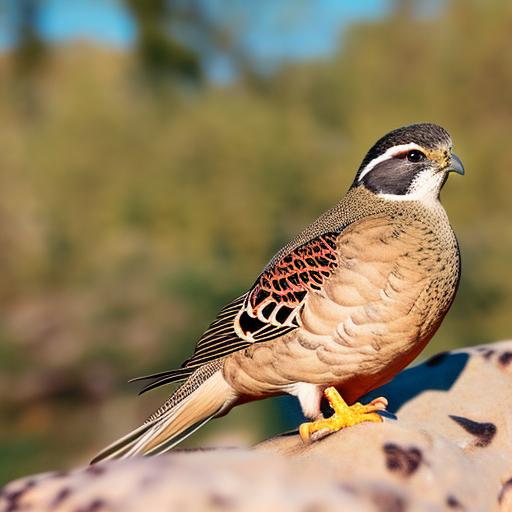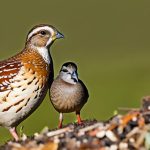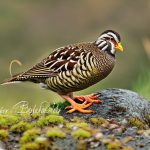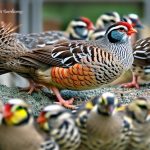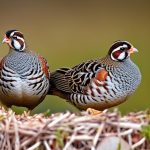King quails, also known as button quails, are small, ground-dwelling birds that are native to Australia and surrounding regions. They are popular among avian enthusiasts for their colorful plumage, small size, and interesting behaviors. King quails are often kept as pets or for breeding purposes, and they can make a delightful addition to a backyard aviary or indoor enclosure.
These tiny birds are known for their vibrant plumage, which can range from shades of brown and gray to striking patterns of black and white. They have a distinctive call that is often described as a soft, repetitive “button” sound, which is where they get their alternative name of button quails. King quails are social birds that thrive in small flocks, and they are known for their active and inquisitive nature. They are relatively easy to care for and can be a great option for bird enthusiasts who are looking for a unique and low-maintenance pet.
Key Takeaways
- King quails are small, ground-dwelling birds native to Australia and are popular as pets due to their colorful plumage and low maintenance requirements.
- When housing king quails, it’s important to provide a spacious enclosure with plenty of hiding spots, substrate for dust bathing, and perches for roosting.
- A balanced diet for king quails includes a mix of seeds, grains, vegetables, and protein sources like mealworms or crickets, along with access to grit for digestion.
- Regular health check-ups, a clean living environment, and a balanced diet are essential for maintaining the wellness of king quails.
- King quails are generally shy and prefer minimal handling, but they can be socialized through gentle interaction and positive reinforcement. Breeding king quails requires a suitable nesting area, proper diet, and a stress-free environment to encourage mating behavior.
- Common behavioral traits of king quails include foraging for food, dust bathing, and making soft, low cooing sounds. They are also known for their monogamous mating behavior and protective nature towards their offspring.
Housing and Enclosure for King Quails
When it comes to housing king quails, it’s important to provide them with a safe and comfortable environment that meets their specific needs. For indoor enclosures, a spacious aviary with plenty of room for flying and exploring is ideal. The enclosure should be made of sturdy materials such as wire mesh or wood, with a solid floor to prevent injury to the birds’ delicate feet. It’s important to provide plenty of perches and hiding spots for the quails to feel secure, as well as nesting boxes if breeding is a goal.
For outdoor enclosures, it’s essential to provide protection from predators and the elements. This can be achieved with a secure wire mesh roof and walls, as well as a sheltered area for the birds to retreat to in inclement weather. The floor of the enclosure should be covered with soft bedding material such as straw or wood shavings to provide a comfortable surface for the quails to walk on. It’s also important to regularly clean the enclosure to maintain a healthy environment for the birds.
Diet and Nutrition for King Quails
Proper nutrition is essential for the health and well-being of king quails. In the wild, these birds primarily feed on a diet of seeds, insects, and small plants. In captivity, it’s important to replicate this natural diet as closely as possible. A high-quality commercial finch or game bird seed mix can form the basis of their diet, supplemented with fresh greens such as spinach, kale, and dandelion leaves. In addition, offering live insects such as mealworms or crickets can provide essential protein and enrichment for the birds.
It’s important to provide access to fresh, clean water at all times, either through a shallow dish or a specialized water dispenser designed for small birds. It’s also important to monitor the quails’ food intake and adjust their diet as needed to ensure they are maintaining a healthy weight. Overfeeding can lead to obesity and related health issues, so it’s important to provide portion-controlled meals and monitor their body condition regularly.
Health and Wellness of King Quails
Like all pets, king quails require regular care and attention to maintain their health and well-being. It’s important to monitor their behavior and appearance daily to look out for any signs of illness or injury. Common health issues in king quails can include respiratory infections, parasites, and nutritional deficiencies. If any concerns arise, it’s important to seek veterinary care from a professional experienced in avian medicine.
Regular grooming is also important for king quails, as they can be prone to overgrown nails and beaks if not provided with suitable surfaces for natural wear. Providing a rough surface such as a concrete perch or mineral block can help keep their nails and beaks in good condition. Additionally, regular baths or access to a shallow water dish can help keep their plumage clean and healthy.
Handling and Interaction with King Quails
King quails are generally not known for being particularly affectionate or cuddly pets, but they can still be enjoyable to observe and interact with. They are naturally skittish birds that may be easily startled by sudden movements or loud noises, so it’s important to approach them calmly and gently. With patience and positive reinforcement, some king quails can become accustomed to being handled and may even enjoy gentle petting or sitting on their owner’s hand.
It’s important to provide plenty of opportunities for mental stimulation and physical activity for king quails to prevent boredom and encourage natural behaviors. This can include providing toys such as hanging mirrors or bells, as well as opportunities for foraging and exploring their environment. Additionally, spending time near their enclosure and talking to them in a soothing voice can help them become more comfortable with human interaction over time.
Breeding and Reproduction of King Quails

Breeding king quails can be a rewarding experience for avian enthusiasts, but it’s important to be prepared for the responsibilities that come with raising young birds. Before attempting to breed king quails, it’s important to ensure that they are in optimal health and condition. Providing a suitable nesting area with soft bedding material is essential for encouraging breeding behavior.
King quails are known for their prolific breeding habits, with females capable of laying multiple clutches of eggs throughout the breeding season. It’s important to provide a balanced diet rich in protein and calcium during this time to support egg production and ensure the health of the breeding pair. Once the eggs are laid, they should be carefully monitored for signs of fertility and development. Incubation periods can vary depending on environmental conditions, but typically range from 14-18 days.
Common Behavioral Traits and Characteristics of King Quails
King quails are known for their active and inquisitive nature, often spending their days foraging for food and exploring their environment. They are social birds that thrive in small flocks, so it’s important to provide them with plenty of opportunities for social interaction within their enclosure. They are also known for their distinctive call, which is often described as a soft “button” sound that they use to communicate with each other.
In addition to their social nature, king quails are also known for their ground-dwelling habits. They prefer to spend most of their time on the floor of their enclosure, so it’s important to provide plenty of soft bedding material for them to walk on. They are also known for their ability to fly short distances when startled or threatened, so it’s important to provide a secure enclosure with a covered roof to prevent escape.
In conclusion, king quails are fascinating birds that can make delightful pets for bird enthusiasts of all experience levels. With proper care, attention, and understanding of their specific needs, these tiny birds can thrive in captivity and bring joy to their owners with their colorful plumage and interesting behaviors. Whether kept for companionship or breeding purposes, king quails have much to offer as unique and charming additions to any aviary or home environment.
If you’re considering keeping king quails as pets, you may also be interested in learning about caring for goslings. Poultry Wizard offers a comprehensive guide on how to care for goslings, covering everything from housing and feeding to health and safety. Check out their article on how to care for goslings to ensure you have all the information you need to provide the best care for your feathered friends.
FAQs
What are king quails?
King quails, also known as button quails, are small ground-dwelling birds native to Australia and surrounding regions. They are popular as pets due to their small size and colorful plumage.
What do king quails eat?
In the wild, king quails primarily eat seeds, insects, and small invertebrates. As pets, they can be fed a diet of commercial bird seed mix, supplemented with fresh fruits and vegetables.
What kind of habitat do king quails need?
King quails require a spacious enclosure with plenty of room to move around. They also need a substrate that allows them to dust bathe, such as sand or fine gravel. Additionally, they need access to hiding spots and perches.
Are king quails social animals?
King quails are social birds and are best kept in pairs or small groups. They enjoy the company of their own kind and will often interact with each other through vocalizations and displays.
What is the average lifespan of a king quail?
In captivity, king quails can live for 5-7 years with proper care. Providing a balanced diet, a suitable habitat, and regular veterinary check-ups can help ensure a long and healthy life for these birds.
Are king quails noisy pets?
King quails are relatively quiet birds, making them suitable for apartment living or close quarters. They may produce soft chirping sounds, especially during breeding season, but they are not known for loud or disruptive vocalizations.
Meet Walter, the feathered-friend fanatic of Florida! Nestled in the sunshine state, Walter struts through life with his feathered companions, clucking his way to happiness. With a coop that’s fancier than a five-star hotel, he’s the Don Juan of the chicken world. When he’s not teaching his hens to do the cha-cha, you’ll find him in a heated debate with his prized rooster, Sir Clucks-a-Lot. Walter’s poultry passion is no yolk; he’s the sunny-side-up guy you never knew you needed in your flock of friends!

